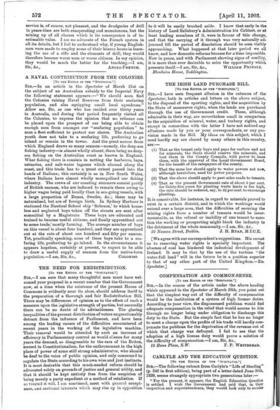A NAVAL CONTRIBUTION FROM THE COLONIES.
[To THE EDITOR OF THE "SPECTATOR."]
Snt,—In an article in the Spectator of March 21st on the subject of an Australian subsidy to the Imperial Navy the following statement appears :—" We should soon find the Colonies raising Naval Reserves from their seafaring population, and also equipping small local squadrons," Allow me, Sir, as one who has resided over thirty years in Australia, and during that period frequently visited all the Colonies, to express the opinion that no reliance can be placed upon the prospect of our being able to obtain enough men from amongst our "seafaring population" to man a fleet sufficient to protect our shores. The Australian youth does not take to a seafaring life, preferring to go inland or remain in the towns. And the great source from which England draws so many seamen—namely, the deep-sea fishing industry—is almost wholly absent, there being no deep- sea fishing on the Australian coast as known in England. What fishing there is consists in netting the harbours, bays, estuaries, and salt-water lagoons which abound along the coast, and this trade has to a great extent passed into the hands of Italians; this certainly is so in New South Wales, where Italians have almost wholly monopolised our fishing industry. The crews of our coasting steamers consist partly of British seamen, who are induced to remain there owing to higher wages being paid locally than in sea-going vessels, with a large proportion of Danes, Swedes, &c. ; these may be naturalised, but are of foreign birth. In Sydney Harbour is stationed the Nautical School ship Sobraon,' to which home- less and neglected boys taken off the streets are sent after committal by a Magistrate. These boys are educated and trained to become useful citizens, and finally apprenticed out to some trade,' mostly farming. The average number of boys on this vessel is about four hundred, and they are apprenticed out at the rate of about one hundred and fifty per annum. Yet, practically speaking, none of these boys take to a sea- faring life, preferring to go inland. In the circumstances it appears hopeless, certainly at present, to expect to be able to draw a useful supply of seaman from the native-born






































 Previous page
Previous page